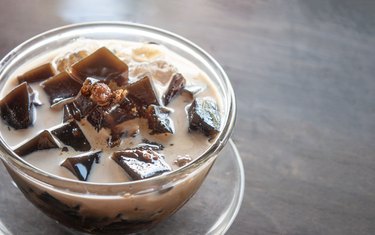
In Asian countries, like Singapore, Indonesia and China, grass jelly is a traditional beverage or dessert that natives believe has medicinal properties. It's often classified as antioxidant, anti-cancer, antibacterial and anti-hypertensive (which means it helps fight high blood pressure).
There isn't a ton of research on grass jelly out there, but the studies that have been done on the gelatinous substance may be a first step to confirming the theories that it can might promote good health in several different ways.
Video of the Day
Video of the Day
What Is Grass Jelly?
Grass jelly comes in two varieties: black and green. Black grass jelly is made from the Mesona palustris plant, while the Cyclea barbata Miers plant is used to make green grass jelly. To make both varieties of glass jelly, the plants' leaves are soaked in water until a gel-like substance is formed.
Once the gel forms, the jelly is often cut into cubes and served with milk tea or alongside fresh fruit, like mango, or sweetened red beans. Just like tea, the finished grass jelly contains phenolic compounds and phytochemicals like flavonoids and tannins (which are natural plant compounds) that provide several health benefits when you eat or drink them.
Read more: Tannin Levels in Teas
Benefits of Grass Jelly
According to a study that was published in Food and Public Health in March 2013, grass jelly is often used to help reduce blood pressure, balance blood sugar and protect against diabetes and liver disease. The report notes that it may also:
- Act as an antioxidant to fight free radicals.
- Fight off potentially harmful bacteria that can cause sickness and infection.
- Protect against cancer.
- Boost the immune system.
Researchers from a study that was published in Procedia Chemistry in December 2014 looked at green grass jelly, specifically. They found that it contains flavonoids — a specific class of phytonutrients —that may help improve intestinal health (and fight intestinal disease), prevent diarrhea and protect against mouth sores and stomach ulcers, in addition to the other general benefits of grass jelly.
Not to be outdone, researchers from an October 2017 report in the Journal of Engineering and Science Research focused on the health benefits of black grass jelly. They reported that one of the biggest health benefits of black grass jelly come from its antioxidant properties.
Read more: OK, But What Are Antioxidants Really?
Because it's rich in antioxidants, black grass jelly has been shown to protect the beta cells in the pancreas (the cells that produce insulin), which can help control blood sugar and reduce the risk of Type 2 diabetes. They also noted that black grass jelly can help lower blood cholesterol levels.
Although it was small, one more study, this one published in the Asia Pacific Journal of Clinical Nutrition in January 2018, found that grass jelly may help control blood sugar levels when eaten with complex carbohydrates. However, the same benefit wasn't seen with simple carbohydrates.
It's important to note that while these studies are promising, the research on grass jelly is still pretty limited. Enjoy grass jelly as part of a balanced diet, but don't count on it for its disease-fighting benefits until more research has been released.
- Asia Pacific Journal of Clinical Nutrition: "Effects of Grass Jelly on Glycemic Control: Hydrocolloids May Inhibit Gut Carbohydrase"
- Food and Public Health: "Immunomodulatory Effect of Instant Tea Powder From Black Cincau (Mesona palustris BL) in the Treatment of Salmonella typhimurium-Induced Infection in Balb Mice"
- Procedia Chemistry: "Effect of a Glycosidic Flavonol Isolated From Green Grass Jelly Abstract (Cyclea barbata Miers) Leaves"
- Journal of Engineering and Science Research: "Bioactivity of Mesona palustris (Black Cincau) as a Nutraceutical Agent"
- International Journal on Advanced Science, Engineering and Information Technology: "Designing and Experimenting Semi-automatic Green Grass Jelly Squeezer"